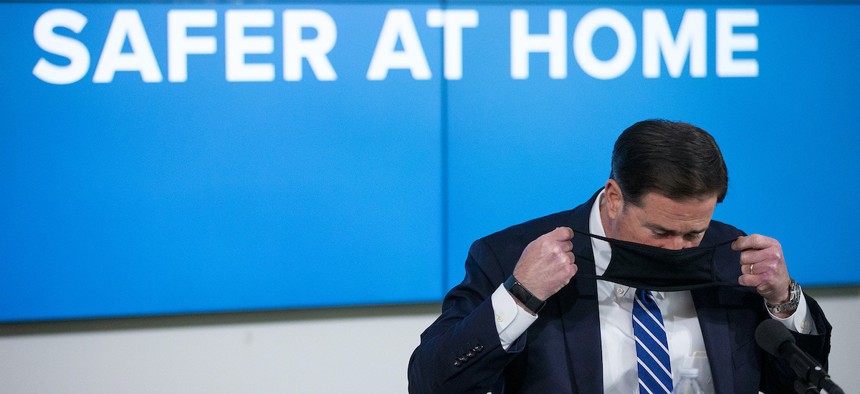Covid-19 Cases Dropped by 75% in One State After Local Leaders Were Allowed to Require Masks

Arizona Gov. Doug Ducey puts on his face mask during a news conference about the coronavirus, Thursday, July 16, 2020, in Phoenix. (Cheryl Evan/The Arizona Republic via AP, Pool) Associated Press
A CDC report said the drop followed a spike in cases in Arizona after the state's stay-at-home order expired, underscoring the utility of face coverings in curbing spread of the disease.
Covid-19 cases in Arizona increased by 151% after the expiration of a statewide stay-at-home order, then plummeted by 75% after city and county leaders were permitted to enforce local mask mandates, according to a report from the Centers for Disease Control and Prevention.
Those results underscore the effectiveness of face coverings in limiting the spread of the virus, though multiple mitigation efforts are necessary to corral the pandemic, researchers wrote.
“A combination of voluntary and enforceable measures is more effective than any single measure,” says the report, authored by officials from the Arizona Department of Health Services, including Dr. Cara Christ, its director.
The report, released last week, analyzed the number of daily Covid-19 cases and seven-day moving averages in Arizona from Jan. 22 through Aug. 7. The roughly seven-month time period includes the state’s declaration of a public health state of emergency (March 11), school closures (March 15), and the implementation of a statewide stay-at-home order (March 31). The state began its phased reopening at the end of April and concluded its stay-at-home order on May 15. Two weeks later, cases began climbing—from 808 on June 1 to 2,026 on June 15.
Case counts continued to increase, peaking between June 29 and July 2, stabilizing between July 3 and July 13 and declining by approximately 75% between July 13 and August 7. The timing of the decrease, according to the report, coincides with the enactment of local mask mandates, which local officials “began implementing and enforcing...via county and city mandates” on June 17, affecting “approximately 85% of the state population.”
"Mitigation measures, including mask mandates, that are implemented and enforced statewide appear to have been effective in decreasing the spread of Covid-19 in Arizona," the report says.
What the report does not mention is that prior to June 17, county and city officials in Arizona lacked the authority to pass or enforce local mask mandates. Gov. Doug Ducey, a Republican, had before then refused to allow local leaders to enact their own policies, part of an executive order that stated that cities, counties and towns could not pass anything that “conflicts with or is in addition to” statewide restrictions (Arizona does not have a statewide mask mandate).
Mayors across the state launched a social media campaign asking him to reconsider, either by passing his own statewide ordinance or giving them the authority to enact their own. On June 17, Ducey issued an “enhanced Covid-19 action plan,” which included a provision “allowing local governments to implement mask and face-covering policies and determine enforcement measures...to tailor mitigation efforts specific to the local public health need.” Multiple municipalities immediately enacted mask mandates, and cases stabilized roughly two weeks later, though hospitalizations continued to climb.
Other factors likely contributed to the decrease, the report notes. The steep dropoff in positive cases came roughly two weeks after Ducey paused the state’s reopening, ordering bars, gyms, movie theaters and water parks to close. He also banned most public gatherings of more than 50 people and limited attendance at pools, and encouraged residents to wear masks, though stopped short of requiring them.
“In Arizona, decreases in daily Covid-19 cases were observed after widespread sustained community mitigation measures that promoted social distancing, limited large gatherings, paused operations of businesses where mask use and social distancing were difficult to maintain, mandated and enforced mask wearing, and promoted voluntary resident actions to stay at home and wear masks,” the report says.
Travel restrictions and mitigating measures in neighboring states may also have helped slow the spread of the virus, researchers said, but “enhanced mitigation measures” were likely the primary driver.
“Enhanced mitigation measures should be implemented by communities and persons to slow Covid-19 spread, particularly before a vaccine or therapeutic treatment becomes widely available,” the report concludes. “State, local, and tribal officials are best positioned to continually monitor data and collaborate to determine the level and types of enhanced mitigation required.”
The report adds to a growing body of research that supports face masks as an effective way to reduce the spread of the virus, as well as potentially reduce the severity of infection among people who contract the disease.
But leaders in more than a dozen states are still resisting mask mandates, even as cases spike in their jurisdictions. North Dakota Gov. Doug Burgum, for example, has declined to require masks despite pleas from doctors, though cases have risen steadily there since July.
Burgum has emphasized masks as an essential part of combating Covid, but said he fears a backlash if there is a state requirement, as many North Dakotans celebrate their individual freedoms. "We've had a great track record so far of relying on personal responsibility, and I guess I'm still hoping in my heart of hearts that North Dakota can step up and figure out a way to get it done (through) local leadership and local execution," Burgum said last month.
South Dakota, where cases have been increasing since mid-September, reported 876 new cases of Covid-19 on Wednesday, its largest single-day total ever. Gov. Kristi Noem, who has refused to pass a statewide mask policy, said the surge was “normal...natural...expected” given the state’s increased testing capabilities, the Rapid City Journal reported.
On Sunday, nine states—Arkansas, Kansas, Missouri, Montana, Nebraska, North Dakota, Oklahoma, Wisconsin and Wyoming—reported record-high hospitalizations of Covid-19 patients. Only four of those require residents to wear masks in public.
Kate Elizabeth Queram is a staff correspondent for Route Fifty and is based in Washington, D.C.
NEXT STORY: How COVID accelerated smart city development





